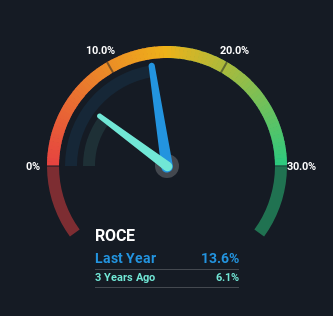- India
- /
- Healthcare Services
- /
- NSEI:APOLLOHOSP
Apollo Hospitals Enterprise's (NSE:APOLLOHOSP) Returns On Capital Are Heading Higher

There are a few key trends to look for if we want to identify the next multi-bagger. Firstly, we'll want to see a proven return on capital employed (ROCE) that is increasing, and secondly, an expanding base of capital employed. Ultimately, this demonstrates that it's a business that is reinvesting profits at increasing rates of return. So on that note, Apollo Hospitals Enterprise (NSE:APOLLOHOSP) looks quite promising in regards to its trends of return on capital.
What Is Return On Capital Employed (ROCE)?
For those who don't know, ROCE is a measure of a company's yearly pre-tax profit (its return), relative to the capital employed in the business. To calculate this metric for Apollo Hospitals Enterprise, this is the formula:
Return on Capital Employed = Earnings Before Interest and Tax (EBIT) ÷ (Total Assets - Current Liabilities)
0.14 = ₹16b ÷ (₹156b - ₹38b) (Based on the trailing twelve months to December 2023).
So, Apollo Hospitals Enterprise has an ROCE of 14%. By itself that's a normal return on capital and it's in line with the industry's average returns of 14%.
See our latest analysis for Apollo Hospitals Enterprise

Above you can see how the current ROCE for Apollo Hospitals Enterprise compares to its prior returns on capital, but there's only so much you can tell from the past. If you'd like to see what analysts are forecasting going forward, you should check out our free analyst report for Apollo Hospitals Enterprise .
So How Is Apollo Hospitals Enterprise's ROCE Trending?
Apollo Hospitals Enterprise is displaying some positive trends. The data shows that returns on capital have increased substantially over the last five years to 14%. The company is effectively making more money per dollar of capital used, and it's worth noting that the amount of capital has increased too, by 65%. So we're very much inspired by what we're seeing at Apollo Hospitals Enterprise thanks to its ability to profitably reinvest capital.
What We Can Learn From Apollo Hospitals Enterprise's ROCE
To sum it up, Apollo Hospitals Enterprise has proven it can reinvest in the business and generate higher returns on that capital employed, which is terrific. And with the stock having performed exceptionally well over the last five years, these patterns are being accounted for by investors. In light of that, we think it's worth looking further into this stock because if Apollo Hospitals Enterprise can keep these trends up, it could have a bright future ahead.
One more thing to note, we've identified 1 warning sign with Apollo Hospitals Enterprise and understanding this should be part of your investment process.
If you want to search for solid companies with great earnings, check out this free list of companies with good balance sheets and impressive returns on equity.
New: Manage All Your Stock Portfolios in One Place
We've created the ultimate portfolio companion for stock investors, and it's free.
• Connect an unlimited number of Portfolios and see your total in one currency
• Be alerted to new Warning Signs or Risks via email or mobile
• Track the Fair Value of your stocks
Have feedback on this article? Concerned about the content? Get in touch with us directly. Alternatively, email editorial-team (at) simplywallst.com.
This article by Simply Wall St is general in nature. We provide commentary based on historical data and analyst forecasts only using an unbiased methodology and our articles are not intended to be financial advice. It does not constitute a recommendation to buy or sell any stock, and does not take account of your objectives, or your financial situation. We aim to bring you long-term focused analysis driven by fundamental data. Note that our analysis may not factor in the latest price-sensitive company announcements or qualitative material. Simply Wall St has no position in any stocks mentioned.
About NSEI:APOLLOHOSP
Apollo Hospitals Enterprise
Engages in the provision of healthcare services in India and internationally.
Flawless balance sheet with high growth potential.


